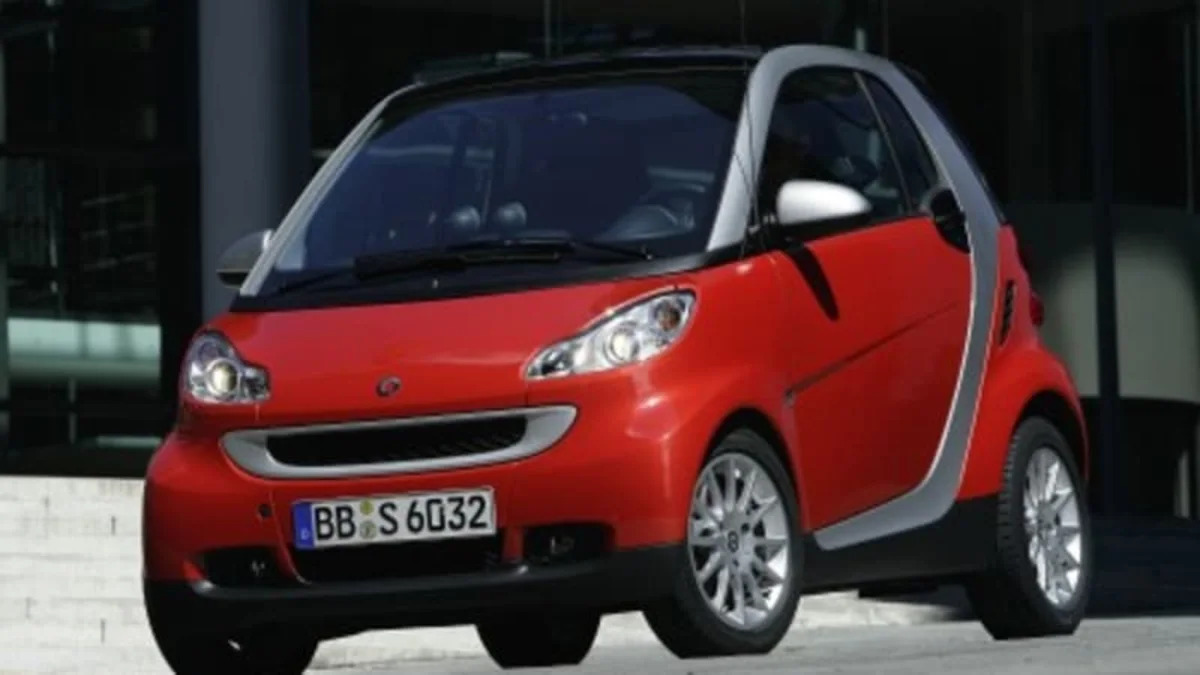
In the latest sustainability report from the company soon to be formerly known as DaimlerChrysler, Dr. Thomas Weber outlined some of the companies near-term plans. Some of the company's plans for cleaner technology such as their advanced BlueTec diesel emission control system are being sped up. BlueTec with urea injection will available on the Mercedes E300 will be available from December 2007 rather than in 2008.
The Smart ForTwo micro hybrid will also go on sale October using a mild hybrid start-stop system and limited regenerative braking. Daimler is also working on optimizing their internal combustion engines to try and make gas engines as efficient as diesel and diesels as clean as gas. The report mentions a new engine type that combines the best of both engine types which is most likely some kind of HCCI engine. In addition all of Daimler's new vehicles are being designed to accommodate a hybrid option. The report summary is after the jump.
[Source: DaimlerChrysler]
Sustainability means more than reducing CO2
- DaimlerChrysler pursuing an integrated approach
- Environmentally compatible technologies in combination with economic and social responsibility
- Average fleet consumption in main focus of activities
- Launch of BLUETEC in Europe brought forward
Spotlight on climate protection
Climate protection is at the centre of the Sustainability Report 2007. That this issue has been taken seriously at DaimlerChrysler not just since the start of the public debate, is comprehensively demonstrated by the Report, which sets out the company's integrated approach to the environment - from production and the overall life cycle of its vehicles through to recycling. For instance, numerous measures were successfully taken in 2006 to reduce CO2 emissions in production by 8.5 percent in comparison with the previous year. In addition, further advances were made in terms of engine-related improvements through the introduction of new technologies such as direct petrol injection and piezo injectors in diesel engines. "There are still plenty of avenues left to explore," stated Prof. Herbert Kohler, Vice President Group Research and Advanced Engineering Body and Powertrain as well as Chief Environmental Officer at DaimlerChrysler, as he commented on the state of the art with regard to reducing fuel consumption. "This is why our research and development work is mainly focused on further optimisation of the internal combustion engine, besides the development of alternative power trains. Our goal is to make the petrol engine as efficient as the diesel and the diesel as clean as the petrol engine." The company is therefore working, among other things, on a new concept that combines the advantages of both engine types. All vehicles will be developed with hybridisation option. The combination of an efficient combustion engine and a hybrid module results in the ideal power train – depending on the application and customer requirements.
Triple focus on environment, economy and social responsibility
However, DaimlerChrysler's approach to sustainability goes far beyond the issue of climate protection. The company takes an all-encompassing view of sustainable economic practice, to pay attention to all three dimensions. By means of environmentally-friendly vehicles, drive systems, production processes and fuels, it strives to make mobility sustainable, Furthermore, the protection of human life through active and passive safety systems is one of the company's declared goals in connection with the further development of its vehicles.
For DaimlerChrysler, sustainability also means the successful long-term management of resources as well as social commitment in all places where the company is active. DaimlerChrysler demonstrates its sense of responsibility especially vis-a-vis its employees through a wide range of fringe benefits and programmes aimed at protecting health and promoting the compatibility of family and career.
DaimlerChrysler sees its role as that of a Good Corporate Citizen, socially and culturally committed to the interests of humankind, above all to future generations. This approach is highlighted, for example, by DaimlerChrysler's training centres in many regions of the world, by the Mondialogo initiative for intercultural dialogue, and by the voluntary commitment shown by the company's employees in countless social projects and initiatives directly related to their work.


Sign in to post
Please sign in to leave a comment.
Continue